International Heritage Centre blog
Josephine Butler, Florence Booth and 'The Maiden Tribute of Modern Babylon'
Josephine Butler, Florence Booth and 'The Maiden Tribute of Modern Babylon'
Those of you who have at one stage or another studied some aspect of the Victorian era will have probably stumbled across the Pankhursts – the militant suffragettes; the Brontes – the celebrated authors; Florence Nightingale – the ‘lady with the lamp’; or even Annie Besant – the leader of ‘the Matchgirls Strike’. But ‘the patron saint of prostitutes’? Perhaps not…
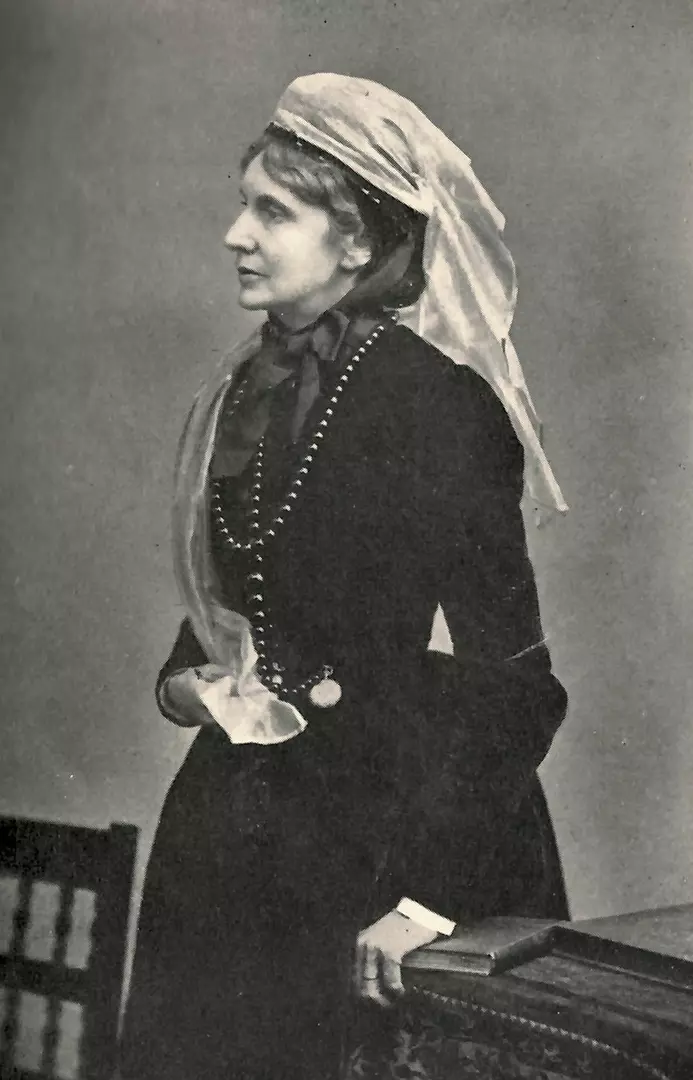
Alongside the pioneering women previously mentioned, Josephine Butler inhabits an integral place among first wave feminist reformers. Amongst women who in many ways (dare I say it) began the process of breaking the glass ceiling for British women of their own era whilst also achieving immense advances in the battle for gender equality for women of the future. Through her ambition to combat ‘moral evil’ in Victorian society, philanthropic activist Josephine Elizabeth Butler [née Grey] devoted her life to improving the intellectual, spiritual and financial prospects of women of all classes. Her repertoire of achievements include campaigning for women’s enfranchisement and higher education; reforming ‘fallen women’ for re-entry into respectable society; forming and leading the Married Women’s Property Committee to challenge the law of couverture (a law that made women the property of their husbands upon marriage); and spearheading the Ladies National Association for the Abolition of the State Regulation of Vice (later The Association for Moral and Social Hygiene) whose members campaigned to repeal the Contagious Diseases Acts of 1864, 1866 and 1869. In efforts to combat venereal disease, these Acts had permitted forcible internal examinations of women who the police thought ‘might’ be sex workers.
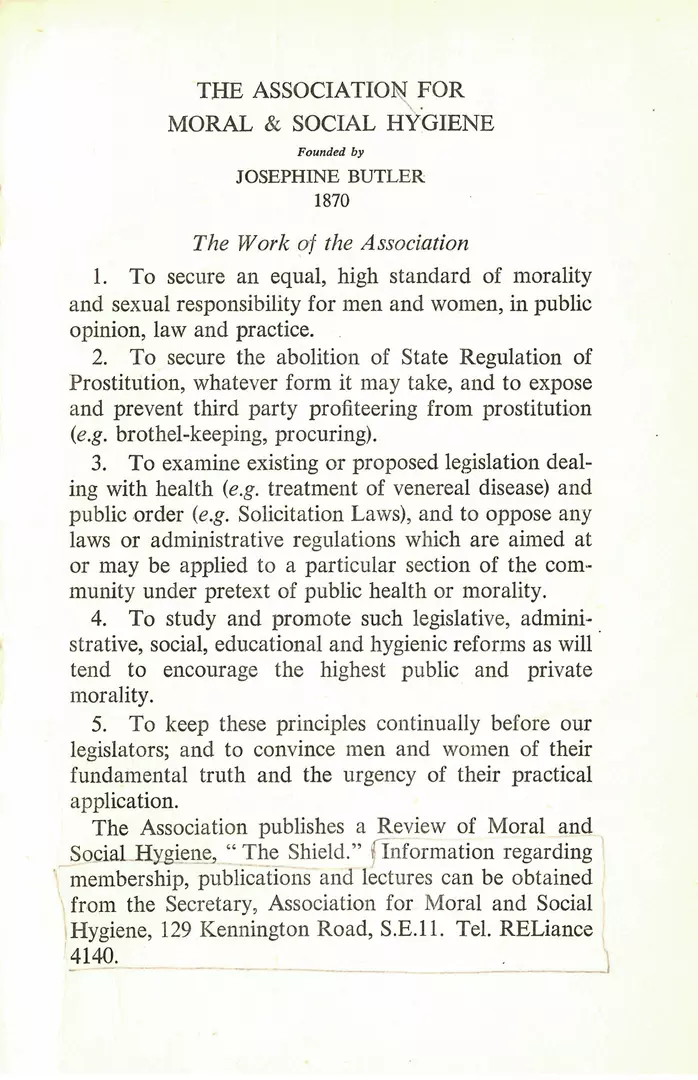
Early work
After marrying George Butler in 1852, Josephine and her husband moved to Oxford where she began charitable work with fallen women while he worked at the University. Whilst doing so, she continually crossed the precarious border between the opposing worlds of virtue and vice that, within Victorian society, ideologically and physically separated respectable women from their ‘fallen’ sisters. In complete defiance of this social norm, the most risky of her decisions in this period was to accept a ‘ruined’ woman, who had previously been imprisoned in Newgate Gaol upon charges of infanticide, into her home as a maid. However, despite spending her days working on the ‘wrong’ side of the great Victorian female divide, Butler remarkably retained a respectable reputation due to her additional adherence to the virtuous rules assigned to her sex by Victorian society: marriage, motherhood, morality, and piety.
The Salvation Army
From the influence of its co-founder Catherine Booth, an advocate of female ministry, The Salvation Army has always had gender equality amongst its clergy enshrined within its constitution. In extension of this progressive attitude toward woman’s status, The Salvation Army also has a longstanding history of working to help women who have been rejected by society. One figure who pioneered this social work within The Army from its early days was Florence Booth [née Soper], who like Butler, also dedicated her life to philanthropic work with women. After marrying Bramwell Booth (first son of Salvation Army founders William and Catherine Booth) on 12 October 1882, Florence was appointed to run the first Salvation Army rescue home for fallen women in Hanbury Street, Whitechapel in May 1884 and served as The Army’s first head of Rescue Work and Women’s Social Work from then until 1912.
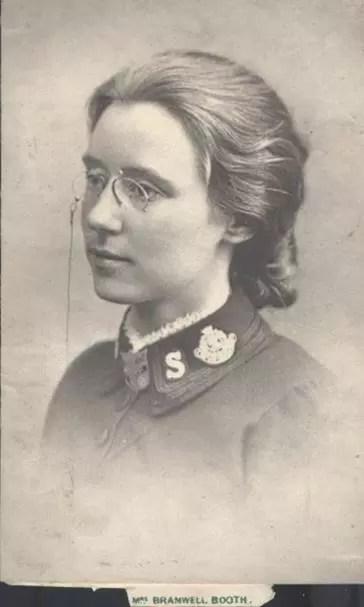
The Maiden Tribute of Modern Babylon
After taking up her pen in support of The Salvation Army when it met with opposition in Switzerland in 1883, Butler formed a close association with Florence Booth thanks to their mutual religious and charitable interest in social work. This came to a head in 1885 with the infamous ‘Maiden Tribute of Modern Babylon’ case which started as a series of articles written by William Stead, editor of The Pall Mall Gazette. These articles depicted the horrors of child prostitution in London which Stead substantiated by staging the abduction of a thirteen-year-old girl, Eliza Armstrong, who was ‘procured’ from her mother by an accomplice supplied by The Salvation Army. This was the recently converted former brothel owner Rebecca Jarrett. Stead’s explanation for this extremely unethical stunt was to prove to the public that the sensational content of the ‘Maiden Tribute of Modern Babylon’ articles was not fiction but a portrayal of things that were actually happening at the heart of Victorian British society.
The mastermind behind the exposé is unclear, but according to Bramwell Booth’s memoirs, Josephine Butler played a key role as a consultant and in deciding the timing of publication. However, it was William Stead, Bramwell Booth and Rebecca Jarrett, alongside three other participants, who were collectively identified as the culprits. They were put on trial for the abduction of Eliza Armstrong but whilst Bramwell was acquitted of all charges, both Stead and Jarrett were convicted. Jarrett served a six month sentence in Milbank prison and Stead served a three month sentence in Coldbath-in-the-Fields and Holloway prisons. Stead’s prison uniform from this incarceration is preserved in The Salvation Army International Heritage Centre Museum.

The ‘Eliza Armstrong Case’ as it became coined is also well preserved in the archives of The Salvation Army’s official gazette, The War Cry, in whose pages it was extensively reported upon at the time.
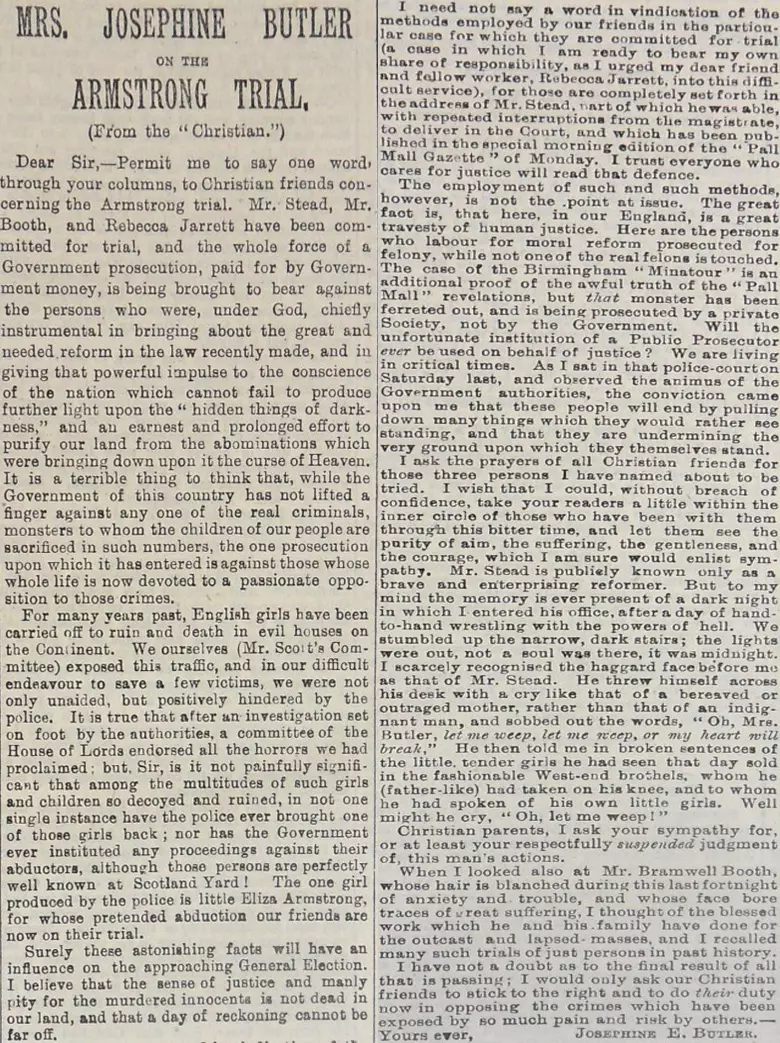
The Criminal Law Amendment Act, 1885
In this particular article Josephine Butler reiterates that the abduction of Eliza Armstrong was ‘pretended’ and carried out by the accused at ‘much pain and risk’ in the service of a campaign for moral reform. Her defence of Stead and Jarrett’s actions was borne out when, despite scandalising Victorian society, the ‘Maiden Tribute of Modern Babylon’ exposé became the catalyst for significant legislative change for women and girls in the form of the Criminal Law Amendment Act of 1885. The Act raised the age of consent for girls from thirteen to sixteen and strengthened legislation condemning prostitution and brothel keeping. This event also stimulated more active involvement in women’s social work across The Salvation Army more widely through raising awareness of the desperate need for ‘the protection of young girls’ in British society.
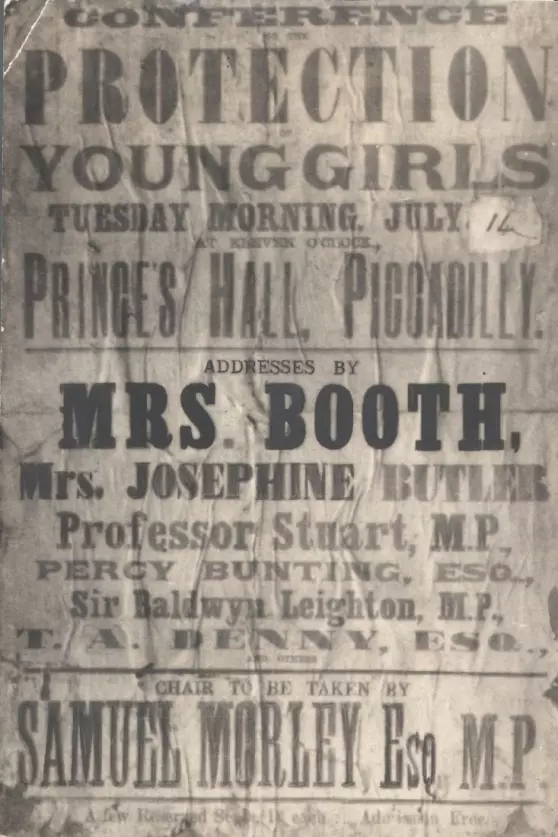
A lifelong friendship
Moreover, the close friendship forged between Florence Booth and Josephine Butler through this episode is evidenced through their continued social work together and is encapsulated in their personal correspondence which has also been preserved in The Salvation Army archive.
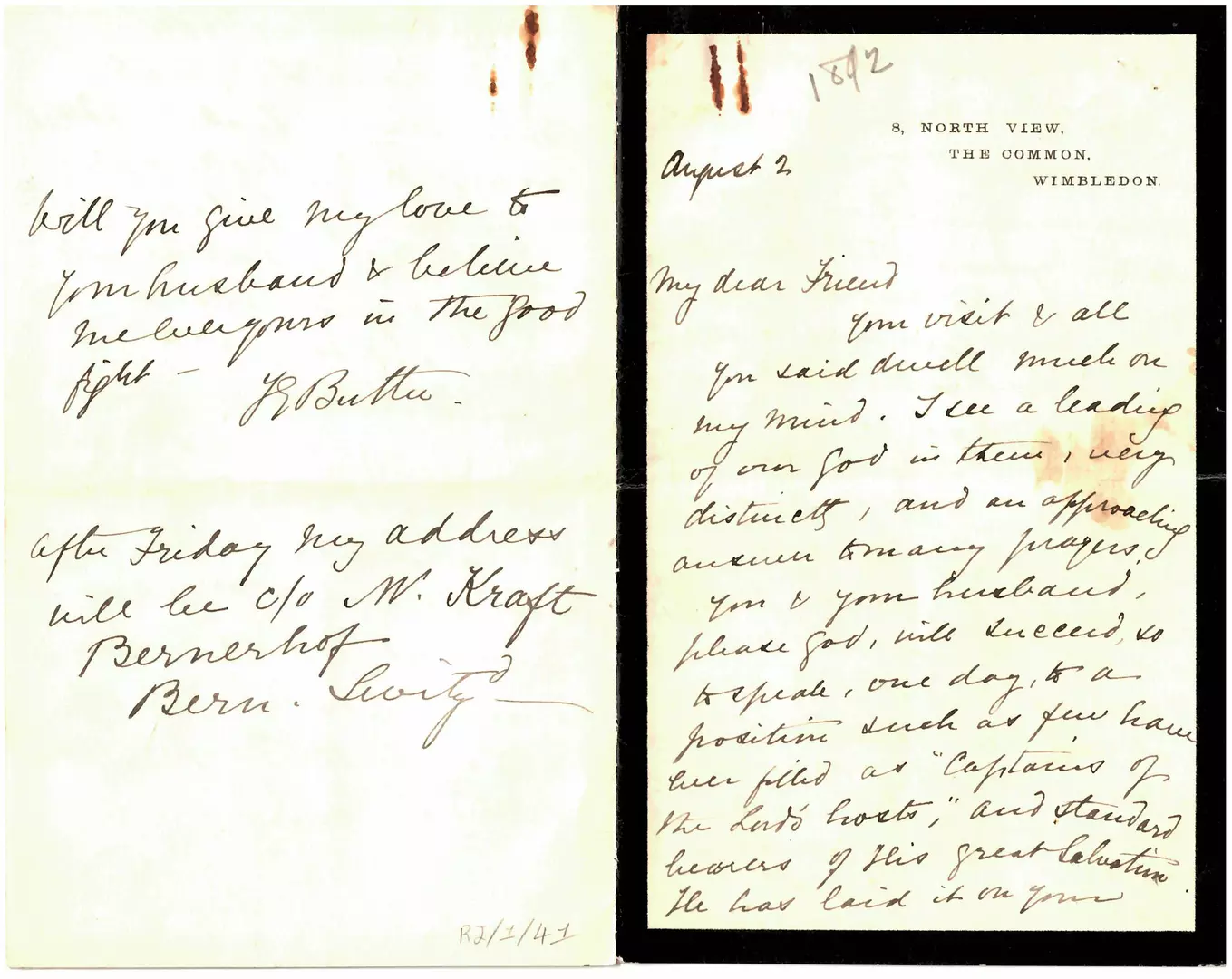
Both Booth and Butler also retained a mutual acquaintance with Rebecca Jarrett, the former sex worker and brothel owner who was asked to play the procuress in the social experiment with Eliza Armstrong. Jarrett’s involvement came after becoming a Salvationist in 1884 and working for a short time as a rescue worker with Josephine Butler. Jarrett thus serves as an emblem of Butler’s collaboration with The Salvation Army that led to monumental practical and legislative changes for British women of all classes. After serving her prison sentence for her part in the Maiden Tribute case, Jarrett went to live in a rescue home in Winchester that had been established by Josephine Butler, and despite suffering some relapses, remained in regular communication with both Josephine and Florence. In the following letter of December 1889 she addressed Florence Booth as ‘My Dear Mother in Christ’ and went on to say ‘I do not forget you. I feel as each day passes over you are more dear to me, also The Salvation Army…I thank God for Mrs Bramwell Booth’, sentiments that are echoed in each of her letters to Florence until her death in 1928.
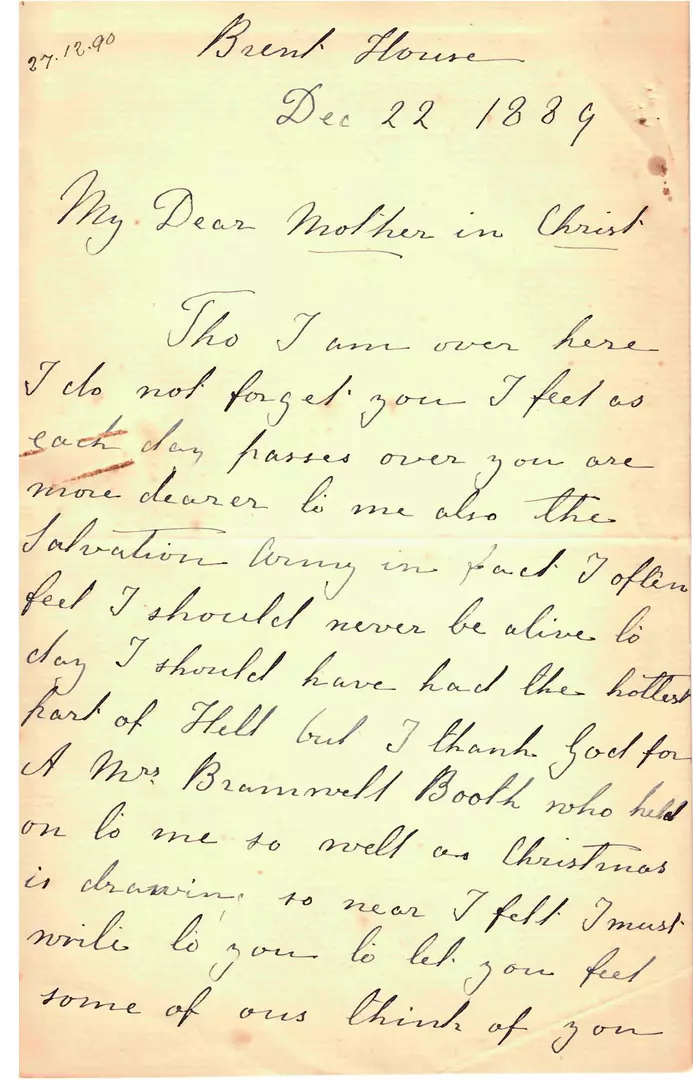
Legacy
Despite the myriad achievements that identified her to some as ‘the most distinguished figure of the nineteenth century’, to most people Josephine Butler, like so many other inspirational women, remains relatively invisible within public memory. I think however, that it is fair to say that Butler’s dedication to moral reform has had an enduring impact on British legislation and culture, and together with Florence and Bramwell Booth, she helped to cement The Salvation Army’s involvement in some of the most significant feminist activities of the Victorian era.
Chloe
December 2017
Further reading
Blair, Grainne. Josephine Butler and Catherine Booth, Political Alliances: The Importance of the Maiden Tribute Agitation and the Eliza Armstrong Case to The Salvation Army in the Nineteenth Century, Women's Studies Department of Government and Society, University of Limerick, 1996
Butler, A.S.G. Portrait of Josephine Butler, Faber and Faber Ltd, 1954
Butler, Josephine. An appeal to the people of England on the recognition and superintendence of prostitution by governments. By an English mother. Frederick Banks, [1870/1871]
Eckley, Grace. Maiden Tribute: A Life of W T Stead, Xlibris, 2007
Johnson, George W & Lucy. Josephine Butler: An autobiographical memoir, J W Arrowsmith Ltd, 1928
Makepeace, Margaret. Whatever happened to Eliza Armstrong?, Untold Lives blog (British Library), 2012 https://blogs.bl.uk/untoldlives/2012/04/whatever-happened-to-eliza-armstrong.html
Mathers, Helen. Patron Saint of Prostitutes: Josephine Butler and a Victorian Sex Scandal, The History Press, 2014
Moyles, R.G. 'The Salvation Army and the 'Maiden Tribute' Affair', in Exploring Salvation Army History: Essays of discovery, AGM Publications, 2009
Moyles, R.G. 'W T Stead's 'Maiden Tribute': The Salvation Army and the Criminal Law Amendment Act', in The Salvation Army and the Public, AGM Publications, 2000
Stead, W.T. Josephine Butler: A Life Sketch, Morgan and Scott, 1887
Stocks, Mary. Josephine Butler and the Moral Standards of Today, 1961
Turner, E.M. Josephine Butler: Her Place in History, Association for Moral and Social Hygiene, [1946]
Unsworth, Madge. Maiden tribute, Salvationist Publishing and Supplies, Ltd, 1949
Wilson, Chloe. Unmade in Modern Babylon: The Life of Rebecca Jarrett, East End Women's Museum blog, 2020, https://eastendwomensmuseum.org/blog/2020/11/18/rebecca-jarrett
Read other blogs from the Heritage Centre
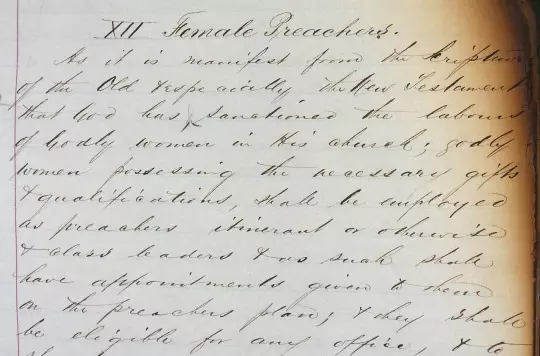
Salvation and Suffrage
An investigation into the relationship between The Salvation Army and the Suffrage campaign at the fin de siècle...

The Swiss Diary of Lieutenant R G Thonger
In 2017, The Salvation Army International Heritage Centre purchased the manuscript diary of a Salvation Army officer who had served in Switzerland in the 1880s...

Voices of civilian internment: Salvation Army archives on Cambridge Digital Library
This August saw the launch of 'Voices of civilian internment: WWII Singapore', a new collection of digitised archive material...
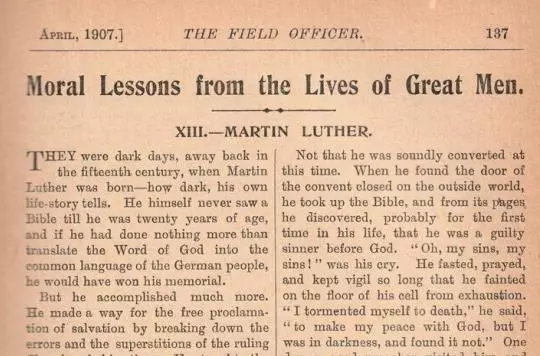
“Such a candle as I trust shall never be put out”: The Salvation Army and the Reformation
On 31 October 2017 it is 500 years since Martin Luther (probably) nailed his 95 theses to the door of the Schlosskirche in Wittenberg...